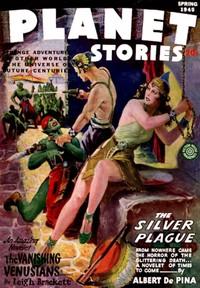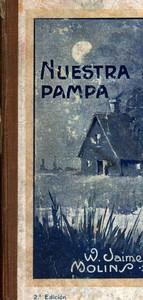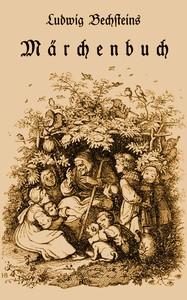Read this ebook for free! No credit card needed, absolutely nothing to pay.
Words: 102822 in 29 pages
This is an ebook sharing website. You can read the uploaded ebooks for free here. No credit cards needed, nothing to pay. If you want to own a digital copy of the ebook, or want to read offline with your favorite ebook-reader, then you can choose to buy and download the ebook.
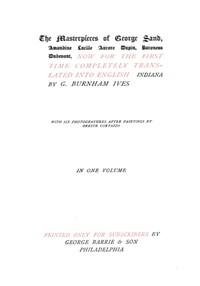

: Indiana by Sand George Cortazzo Oreste Illustrator Ives George Burnham Translator - France Fiction; Man-woman relationships Fiction; Marriage Fiction; Women France Fiction
INTRODUCTION PREFACE TO THE EDITION OF 1832 PREFACE TO THE EDITION OF 1842 PART FIRST PART SECOND PART THIRD PART FOURTH CONCLUSION
INTRODUCTION
I wrote Indiana during the autumn of 1831. It was my first novel; I wrote it without any fixed plan, having no theory of art or philosophy in my mind. I was at the age when one writes with one's instincts, and when reflection serves only to confirm our natural tendencies. Some people chose to see in the book a deliberate argument against marriage. I was not so ambitious, and I was surprised to the last degree at all the fine things that the critics found to say concerning my subversive purposes. Criticism is far too acute; that is what will cause its death. It never passes judgment ingenuously on what has been done ingenuously. It looks for noon at four o'clock, as the old women say, and must cause much suffering to artists who care more for its decrees than they ought to do.
Under all r?gimes and in all times there has been a race of critics, who, in contempt of their own talent, have fancied that it was their duty to ply the trade of denouncers, of purveyors to the prosecuting attorney's office; extraordinary functions for men of letters to assume with regard to their confr?res! The rigorous measures of government against the press never satisfy these savage critics. They would have them directed not only against works but against persons as well, and, if their advice were followed, some of us would be forbidden to write anything whatsoever.
Thank God, I have forgotten the names of those who tried to discourage me at my first appearance, and who, being unable to say that my first attempt had fallen completely flat, tried to distort it into an incendiary proclamation against the repose of society. I did not expect so much honor, and I consider that I owe to those critics the thanks which the hare proffered the frogs, imagining from their alarm that he was entitled to deem himself a very thunderbolt of war.
GEORGE SAND.
Nohant, May, 1852.
PREFACE TO THE EDITION OF 1832
If certain pages of this book should incur the serious reproach of tending toward novel beliefs, if unbending judges shall consider their tone imprudent and perilous, I should be obliged to reply to the criticism that it does too much honor to a work of no importance; that, in order to attack the great questions of social order, one must either be conscious of great strength of purpose or pride one's self upon great talent, and that such presumption is altogether foreign to a very simple tale, in which the author has invented almost nothing. If, in the course of his task, he has happened to set forth the lamentations extorted from his characters by the social malady with which they were assailed; if he has not shrunk from recording their aspirations after a happier existence, let the blame be laid upon society for its inequalities, upon destiny for its caprices! The author is merely a mirror which reflects them, a machine which reverses their tracing, and he has no reason for self-reproach if the impression is exact, if the reflection is true.
Consider further that the narrator has not taken for text or devise a few shrieks of suffering and wrath scattered through the drama of human life. He does not claim to conceal serious instruction beneath the exterior form of a tale; it is not his aim to lend a hand in constructing the edifice which a doubtful future is preparing for us and to give a sly kick at that of the past which is crumbling away. He knows too well that we live in an epoch of moral deterioration, wherein the reason of mankind has need of curtains to soften the too bright glare which dazzles it. If he had felt sufficiently learned to write a genuinely useful book, he would have toned down the truth, instead of presenting it in its crude tints and with its startling effects. That book would have performed the functions of blue spectacles for weak eyes.
He does not abandon the idea of performing that honorable and laudable task some day; but, being still a young man, he simply tells you to-day what he has seen, not presuming to draw his conclusions concerning the great controversy between the future and the past, which perhaps no man of the present generation is especially competent to do. Too conscientious to conceal his doubts from you, but too timid to transform them into certainties, he relies upon your reflections and abstains from weaving into the woof of his narrative preconceived opinions, judgments all formed. He plies with exactitude his trade of narrator. He will tell you everything, even painful truths; but, if you should wrap him in the philosopher's robe, you would find that he was exceedingly confused, simple story-teller that he is, whose mission is to amuse and not to instruct.
Even were he more mature and more skilful, he would not dare to lay his hand upon the great sores of dying civilization. One must be so sure of being able to cure them when one ventures to probe them! He would much prefer to arouse your interest in old discarded beliefs, in old-fashioned, vanished forms of devotion, to employing his talent, if he had any, in blasting overturned altars. He knows, however, that, in these charitable times, a timorous conscience is despised by public opinion as hypocritical reserve, just as, in the arts, a timid bearing is sneered at as an absurd mannerism; but he knows also that there is honor, if not profit, in defending lost causes.
Free books android app tbrJar TBR JAR Read Free books online gutenberg
More posts by @FreeBooks

: Twenty Unsettled Miles in the Northeast Boundary [From the Report of the Council of the American Antiquarian Society presented at the Annual Meeting held in Worcester October 21 1896] by Mendenhall Thomas C Thomas Corwin - Passamaquoddy Bay (N.B. and Me.)
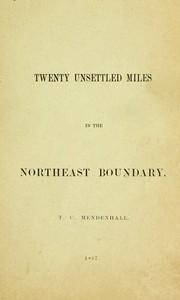

: Double Trouble by Jacobi Carl Anderson Murphy Illustrator - Science fiction; Short stories; Authors Fiction; Older women Fiction; Flowers Annabella C. (Fictitious character) Fiction
